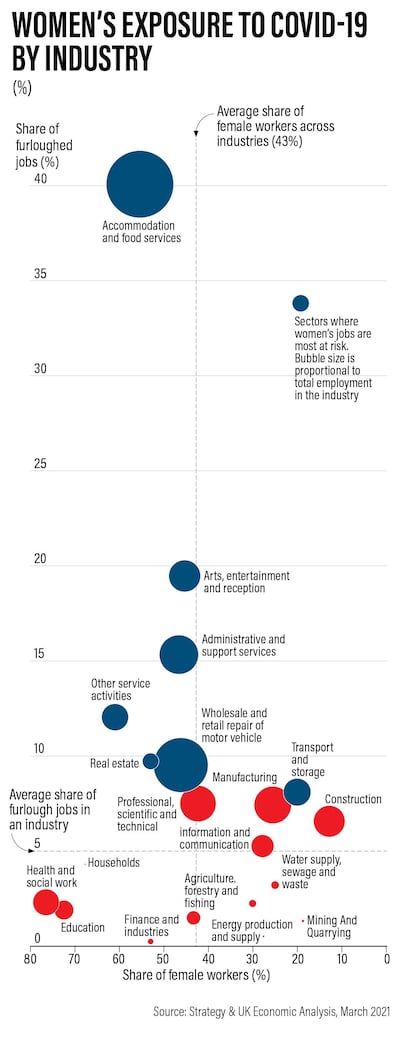Women are more affected by Covid-related job losses than men in 17 of 24 countries in the Organisation for Economic Co-operation and Development that reported an increase in unemployment in 2020, PricewaterhouseCoopers' annual Women in Work Index shows.
Between July and October 2020, 15.3 million people were put on furlough in the UK.
Of the furloughed jobs for which gender breakdowns were available, 52 per cent were women’s jobs, despite women only making up 48 per cent of the workforce.
In the UK, female-dominated industries such as accommodation, food services, arts, entertainment and recreation had the largest share of furloughs in the country.
The study assessed female economic empowerment, in which the UK was 16th of 33 nations in the OECD countries in 2019.
The top three countries were Iceland, Sweden and New Zealand.
But the UK's place in the index is expected to fall in 2021, setting progress for women in work back to 2017 levels.
Progress towards gender equality will have to be double its normal speed to reverse the damage by 2030.
For nine years, all OECD member countries have made consistent gains towards women's economic empowerment.
But because of Covid-19 this trend will be reversed and will not begin to recover until 2022, when it should regain 0.8 points.
The UK's Coronavirus Job Retention Scheme means the full effect of the pandemic on the labour market has not yet been seen.
But if current furlough data indicates future unemployment trends, a larger number of women will be at risk of job losses than men when the initiative ends in April.
Even before the pandemic began, women spent an average of six more hours on unpaid childcare every week than men, according to research by UN Women.
Women have taken on an even greater share during the pandemic and now spend 7.7 more hours a week on unpaid childcare than men.
This "second shift" is almost as long as an extra full-time job.
The longer this burden lasts, the more women are likely to leave or reduce the time they spend working permanently.
“Losing women from the workforce not only reverses progress towards gender equality, it also affects economic growth," said Larice Stielow, senior economist at PwC.
"Although jobs will return when economies bounce back, they will not necessarily be the same jobs.
"If we don't have policies in place to directly address the unequal burden of care, and to enable more women to enter jobs in growing sectors of the economy, women will return to fewer hours, lower-skilled and lower-paid jobs."
While some women may decide to leave the workforce temporarily because of the effects of the pandemic, research suggests career breaks have long-term effects on their job prospects.
"Based on our findings, there is absolutely no time to lose in addressing the very real impact of the pandemic on women," said Laura Hinton of PwC.
"Governments, policymakers and businesses all have a responsibility to work together to empower women and create opportunities for meaningful participation in the workforce.
"For businesses in particular, it’s paramount that gender pay-gap reporting is prioritised, with targeted action plans put in place as businesses focus on building back better and fairer.
"An important action that should be front and centre of these plans is focusing on developing skills and training initiatives that are tailored to the needs of women, ensuring women can access employment in high-growth sectors such as technology.”



